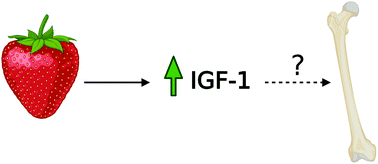Effects of strawberries on bone biomarkers in pre- and stage 1-hypertensive postmenopausal women: a secondary analysis
Abstract
Postmenopausal women experience an increase in bone remodeling with the rate of bone resorption superseding the rate of bone formation. This results in a net bone loss with a subsequent increased risk for osteoporosis and fractures. High blood pressure (BP) has been associated with loss of bone mineral density and increased propensity to fractures. Strawberries are rich in polyphenols, which have been shown to have anti-hypertensive and bone-protective properties. Thus, we examined whether daily intake of strawberries would positively affect biomarkers of bone metabolism in postmenopausal women with pre- and stage 1-hypertension. Participants (age: 59 ± 6 years; body mass index: 31.5 ± 4.1 kg m−2; systolic BP: 140 ± 13 mmHg) were randomly assigned to consume (1) 50 g of freeze-dried strawberry powder (FDSP), (2) 25 g FDSP + 25 g of placebo powder, or (3) 50 g placebo powder for eight weeks. Results indicate a significant time-by-treatment interaction (P = 0.04) for serum insulin-like growth factor (IGF)-1, a hormone that plays a major role in bone formation. Serum concentrations of bone-specific alkaline phosphatase, a marker of bone formation, and tartrate-resistant acid phosphatase-5b, a specific marker of bone resorption, were not affected by FDSP compared to placebo. Although not statistically significant, after eight weeks, osteocalcin increased in the 50 g FDSP group with a large effect size (d = 0.6) when compared to the placebo-control group. Adiponectin increased by 5% and 6% in the 25 g and 50 g FDSP groups, respectively, while it declined in the placebo-control group by 25% (P = 0.03 for time-by-treatment interaction). Our findings suggest that consumption of 25 g FDSP increases IGF-1 in postmenopausal women with pre- and stage 1-hypertension. However, further studies are needed to assert the effectiveness of a strawberry intervention for bone health.



 Please wait while we load your content...
Please wait while we load your content...